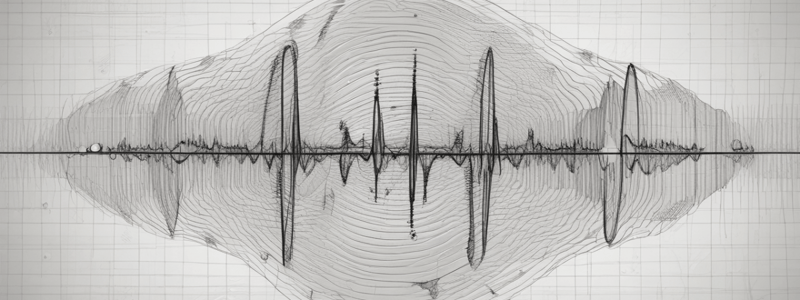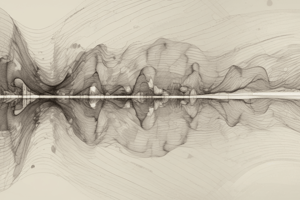Podcast
Questions and Answers
What is the primary factor that influences the diagnostic quality of ultrasound images?
What is the primary factor that influences the diagnostic quality of ultrasound images?
- The speed of sound wave propagation
- The frequency of the sound waves
- The wavelength of the sound waves (correct)
- The amplitude of the sound waves
What is the wavelength of the sound wave in the given figure?
What is the wavelength of the sound wave in the given figure?
- 0.31 mm (correct)
- 0.15 mm
- 0.62 mm
- 1.54 mm
What does the propagation speed of a sound wave refer to?
What does the propagation speed of a sound wave refer to?
- The frequency of the sound wave
- The amplitude of the sound wave
- The wavelength of the sound wave
- The rate at which a sound wave moves through a medium (correct)
Do sound waves with different frequencies travel at different speeds in the same medium?
Do sound waves with different frequencies travel at different speeds in the same medium?
What is a characteristic of sound wave propagation speed?
What is a characteristic of sound wave propagation speed?
What is the relationship between the wavelength of a sound wave and its penetration?
What is the relationship between the wavelength of a sound wave and its penetration?
What is the term for the range of frequencies emitted by a pulsed transducer?
What is the term for the range of frequencies emitted by a pulsed transducer?
What type of ultrasound diagnostic images are generated by pulsed wave transducers?
What type of ultrasound diagnostic images are generated by pulsed wave transducers?
In which medical field is continuous wave ultrasound predominantly employed?
In which medical field is continuous wave ultrasound predominantly employed?
What is the purpose of Pulse Repetition Frequency (PRF) in ultrasound?
What is the purpose of Pulse Repetition Frequency (PRF) in ultrasound?
What is the relationship between imaging depth and PRF?
What is the relationship between imaging depth and PRF?
What determines the determination of PRF?
What determines the determination of PRF?
Who can adjust the PRF?
Who can adjust the PRF?
What is the limitation of continuous wave sound?
What is the limitation of continuous wave sound?
What is the purpose of adjusting Pulse Repetition Frequency (PRF)?
What is the purpose of adjusting Pulse Repetition Frequency (PRF)?
What is the relationship between Pulse Repetition Period (PRP) and Pulse Repetition Frequency (PRF)?
What is the relationship between Pulse Repetition Period (PRP) and Pulse Repetition Frequency (PRF)?
What happens to the Pulse Repetition Period (PRP) when Pulse Repetition Frequency (PRF) increases?
What happens to the Pulse Repetition Period (PRP) when Pulse Repetition Frequency (PRF) increases?
What is the typical range of Pulse Repetition Period (PRP) in clinical imaging?
What is the typical range of Pulse Repetition Period (PRP) in clinical imaging?
What is Pulse Repetition Period (PRP)?
What is Pulse Repetition Period (PRP)?
What is the unit of Pulse Repetition Period (PRP)?
What is the unit of Pulse Repetition Period (PRP)?
Who influences the determination of Pulse Repetition Period (PRP)?
Who influences the determination of Pulse Repetition Period (PRP)?
What is the formula to calculate Pulse Repetition Period (PRP)?
What is the formula to calculate Pulse Repetition Period (PRP)?
What is the unit of measurement for pulse duration?
What is the unit of measurement for pulse duration?
How many cycles are typically found in a sonographic pulse?
How many cycles are typically found in a sonographic pulse?
What is the effect of increasing the frequency on pulse duration?
What is the effect of increasing the frequency on pulse duration?
What is the formula to calculate pulse duration?
What is the formula to calculate pulse duration?
What is the duty factor in continuous wave ultrasound?
What is the duty factor in continuous wave ultrasound?
What is the duty factor in pulsed wave ultrasound?
What is the duty factor in pulsed wave ultrasound?
What is the purpose of the listening time in ultrasound?
What is the purpose of the listening time in ultrasound?
What determines the percentage of time that the ultrasound system transmits sound?
What determines the percentage of time that the ultrasound system transmits sound?
What is necessary for refraction to occur?
What is necessary for refraction to occur?
Why does refraction occur?
Why does refraction occur?
What determines the direction of the refracted beam?
What determines the direction of the refracted beam?
What is the condition for refraction to occur?
What is the condition for refraction to occur?
What is refraction?
What is refraction?
What law defines the refraction process?
What law defines the refraction process?
Flashcards are hidden until you start studying
Study Notes
Ultrasound Image Quality
- Wavelength is a crucial parameter that influences the diagnostic quality of ultrasound images
- Shorter-wavelength sound waves have superior spatial resolution but less penetration
Sound Wave Parameters
- Propagation speed (c) refers to the rate at which a sound wave moves through a medium
- Within a specific medium, sound waves travel at a consistent speed, regardless of their frequency
- The speed of sound wave propagation varies across different mediums
Pulsed Wave Transducers
- Pulsed wave transducers are responsible for generating all types of ultrasound diagnostic images
- They emit ultrasound waves that span a variety of frequencies, referred to as the 'frequency bandwidth'
Continuous Wave (CW) Ultrasound
- Continuous wave ultrasound is predominantly employed in echocardiography for acquiring CW Doppler information
- It is incapable of creating anatomic images
Pulse Repetition Frequency (PRF)
- PRF refers to the number of sound pulses generated by the transducer per second
- The determination of PRF is attributed to the sound source and can be adjusted by the sonographer
- There is an inverse relationship between imaging depth and PRF, meaning as imaging depth increases, PRF decreases
Pulse Repetition Period (PRP)
- PRP refers to the time from the beginning of one pulse to the beginning of the next one
- PRP decreases while PRF increases because, when more pulses occur in a second, the time between them decreases
- PRP is the reciprocal of PRF, expressed in milliseconds or any unit of time (PRP = 1 / PRF)
Pulse Duration (PD)
- PD is the time that it takes for one pulse to occur
- PD is equal to the period (the time for one cycle) times the number of cycles in the pulse (n) and is expressed in microseconds (PD(μs) = n ×T(μs))
- PD decreases if the number of cycles in a pulse is decreased or if the frequency is increased (reducing the period)
Duty Factor (DF)
- The duty factor is the percentage of time that the ultrasound system transmits sound
- DF is the fraction of the PRP that the sound is on
- DF = Pulse duration/pulse repetition period
Factors Contributing to Attenuation: Refraction Process
- Refraction is the change in direction of a sound wave as it passes across a boundary between two different media at an oblique angle
- Refraction only occurs if the sound wave hits the boundary at an angle that is not 90 degrees (Oblique Incidence)
- The speed of sound must differ between the two media; if the speeds are the same, no refraction will occur
- Refraction occurs due to the difference in propagation speeds of sound in different media, as defined by Snell's Law
Studying That Suits You
Use AI to generate personalized quizzes and flashcards to suit your learning preferences.




